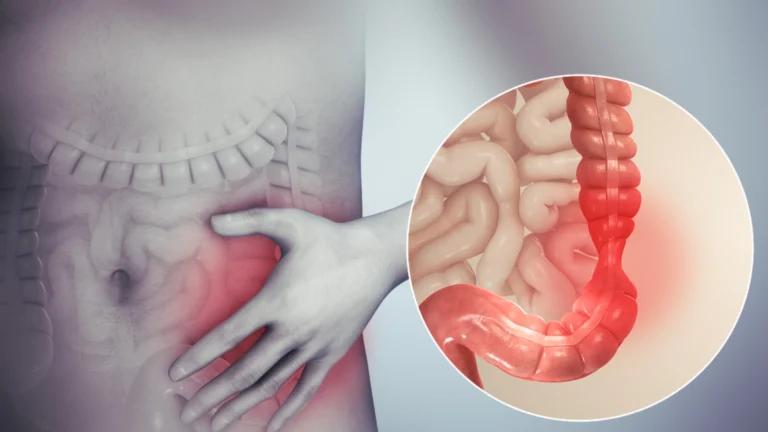Irritable Bowel Syndrome (IBS)
Get valuable insights into Irritable Bowel Syndrome (IBS), including its causes, symptoms, prevention strategies, and treatment options, while also learning about how you can lower the cost of the medications used to treat Irritable Bowel Syndrome (IBS).

MEDICAL INFORMATION
Irritable Bowel Syndrome (IBS) Key Facts
Related Medications
What is the definition of irritable bowel syndrome (IBS)?
Irritable Bowel Syndrome (IBS), which is a sometimes referred to as spastic colon, is a common gastrointestinal disorder that affects the functioning of the intestines. It is characterized by a group of symptoms that can vary from person to person and may include abdominal pain, bloating, changes in bowel habits (such as diarrhea, constipation, or a combination of both), and discomfort or relief of symptoms after a bowel movement.
What is the difference between irritable bowel syndrome (IBS) and Irritable bowel disease (IBD)?
IBD and IBS have different causes and treatments. IBD, which covers Crohn’s disease and ulcerative colitis, is an autoimmune condition that causes inflammation of the GI (gastrointestinal) tract. IBS is a common condition that affects the digestive systems and results from digestive problems and increased gut sensitivity.
What are the risk factors of irritable bowel syndrome (IBS)?
Irritable Bowel Syndrome (IBS) is a gastrointestinal disorder characterized by recurring abdominal pain, changes in bowel habits, and other symptoms. While the exact cause of IBS is unknown, there are several risk factors that have been associated with its development. These risk factors include:
Gender
Women are more commonly affected by IBS than men. Hormonal fluctuations during menstruation and pregnancy may contribute to the higher prevalence of IBS in women.
Age
IBS can occur at any age, but it often develops in young adulthood. The risk decreases with age, and symptoms may improve or resolve in older adults.
Family History
Having a family history of IBS increases the likelihood of developing the condition. There may be a genetic predisposition or shared environmental factors within families that contribute to the risk.
Psychological Factors
Emotional stress, anxiety, and depression are commonly associated with IBS. Although they may not directly cause the condition, they can worsen symptoms and trigger flare-ups.
Gastrointestinal Infections
Previous gastrointestinal infections, particularly those caused by bacteria or parasites, have been linked to the development of IBS. This is known as post-infectious IBS (PI-IBS).
Food Intolerances and Sensitivities
Certain foods and beverages, such as lactose, gluten, caffeine, alcohol, and spicy foods, can trigger symptoms in some individuals with IBS. Food intolerances and sensitivities may contribute to the development or exacerbation of symptoms.
Gut Microbiota Imbalance
The gut microbiota, the collection of bacteria and other microorganisms in the intestines, play a crucial role in digestive health. Imbalances in the gut microbiota composition, known as dysbiosis, have been associated with IBS.
Altered Gut Motility
Individuals with IBS often have abnormal intestinal contractions, which can lead to changes in bowel habits and the characteristic symptoms of the condition.
It’s important to note that while these risk factors are associated with IBS, the condition can still occur in individuals without any of these factors. Additionally, the triggers and causes of IBS can vary between individuals, and further research is needed to fully understand the complexity of this condition. If you suspect you have IBS or are experiencing symptoms, it is recommended to consult with a healthcare professional for a proper evaluation and guidance on managing your symptoms.
What are the causes and triggers of irritable bowel syndrome (IBS)?
The causes and triggers of Irritable Bowel Syndrome (IBS) are not fully understood, but several factors have been identified that contribute to its development and exacerbation of symptoms. These include:
The muscles in the walls of the intestines contract and relax to move food through the digestive tract. In individuals with IBS, these contractions may be abnormal, leading to either faster or slower movement of food. Rapid contractions can result in diarrhea, while weak or sluggish contractions can cause constipation.
Intestinal Inflammation
Low-grade inflammation in the digestive tract has been observed in some individuals with IBS. This inflammation may contribute to changes in gut function and heightened sensitivity to certain foods and stimuli.
Abnormal Gut Microbiota
The gut is home to trillions of bacteria and other microorganisms collectively known as the gut microbiota. Imbalances in the composition of the microbiota, known as dysbiosis, have been associated with IBS. Disruptions in the delicate balance of bacteria in the gut can affect gut function and trigger symptoms.
Food Sensitivities
Certain foods and beverages can trigger or worsen symptoms in individuals with IBS. Common trigger foods include dairy products, fatty or fried foods, spicy foods, caffeine, alcohol, and artificial sweeteners. Some individuals may also be sensitive to specific carbohydrates called FODMAPs (fermentable oligosaccharides, disaccharides, monosaccharides, and polyols), which are found in certain fruits, vegetables, grains, and sweeteners.
Stress and Psychological Factors
Stress and psychological factors, such as anxiety and depression, can have a significant impact on IBS symptoms. The connection between the brain and the gut is complex, and emotional stressors can trigger or exacerbate symptoms in susceptible individuals.
Gut-Brain Axis Dysfunction
The gut and the brain communicate bidirectionally through a network known as the gut-brain axis. Dysfunction in this communication pathway can contribute to IBS symptoms. Factors such as altered neurotransmitter levels, abnormal signaling between the gut and brain, and increased sensitivity to pain may be involved.
What are the signs and symptoms of irritable bowel syndrome (IBS)?
Irritable Bowel Syndrome (IBS) is a gastrointestinal disorder that can cause a range of signs and symptoms, which may vary from person to person. The most common signs and symptoms of IBS include:
Abdominal Pain or Discomfort
This is one of the hallmark symptoms of IBS. The pain or discomfort is typically located in the lower abdomen and may be like cramp or sharp in nature. It often improves after a bowel movement.
Altered Bowel Habits
IBS can cause changes in bowel movements, leading to diarrhea, constipation, or a combination of both. Some individuals with IBS experience frequent, loose stools, while others may have infrequent, hard stools. The stool consistency and frequency may fluctuate over time.
Bloating and Excessive Gas
Many people with IBS experience bloating, which is a feeling of fullness or tightness in the abdomen. This can be accompanied by increased gas production and a sensation of trapped gas.
Abnormal Stool Characteristics
Some individuals with IBS may notice mucus in their stools. However, the presence of blood in the stool is not a typical symptom of IBS and should be evaluated by a healthcare professional.
Urgency and Incomplete Bowel Movements
Some individuals with IBS may experience a sudden and urgent need to have a bowel movement. They may also feel a sense of incomplete evacuation even after passing stool.
Abdominal Discomfort or Pain Relieved by Defecation
Many people with IBS find that their abdominal discomfort or pain improves after having a bowel movement.
Fatigue and Sleep Disturbances
It is common for individuals with IBS to experience fatigue and sleep disturbances, which can be attributed to the physical discomfort and impact on daily functioning.
Anxiety and Depression
Emotional symptoms, such as anxiety and depression, are often associated with IBS. The bidirectional relationship between the gut and the brain can contribute to these psychological symptoms.
It’s important to note that the severity and combination of symptoms can vary greatly among individuals with IBS. Some individuals may experience mild symptoms that are manageable, while others may have more pronounced symptoms that significantly affect their quality of life.
When to see a doctor?
Consult a healthcare professional if you notice a persistant change in your bowel movements or any other IBS symptoms. These could be signs of a more severe health issue, such as colon cancer. Symptoms that require immediate medical attention include: – Unexpected weight loss – Nocturnal diarrhea – Rectal bleeding – Iron deficiency anemia – Unexplained vomiting – Pain that doesn’t subside after passing gas or a bowel movement
How is irritable bowel syndrome (IBS) diagnosed?
Irritable Bowel Syndrome (IBS) is typically diagnosed based on a combination of clinical symptoms and the exclusion of other underlying conditions. There is no specific test or single diagnostic marker for IBS. The diagnostic process usually involves the following steps:
Medical History
The healthcare professional will begin by taking a detailed medical history, including a discussion of your symptoms, their duration and frequency, and any factors that worsen or alleviate the symptoms. They may also ask about your family history of gastrointestinal disorders and other relevant medical conditions.
Physical Examination
A physical examination will be conducted to assess your overall health and check for any signs of other underlying conditions that may be contributing to your symptoms.
Diagnostic Criteria
The healthcare professional will evaluate your symptoms based on established diagnostic criteria. The most widely used criteria are the Rome IV criteria, which outline specific symptom patterns and duration required for an IBS diagnosis.
Symptom Evaluation
The healthcare professional will assess the nature and pattern of your symptoms, including the presence of abdominal pain or discomfort, changes in bowel habits, and other associated symptoms. They may use standardized questionnaires to gather more detailed information.
Exclusion of Other Conditions
Since there is no specific test for IBS, the healthcare professional will rule out other gastrointestinal disorders that may mimic IBS. This may involve performing additional tests such as blood tests, stool tests, imaging studies (such as abdominal ultrasound or colonoscopy), or other specialized tests as needed. The purpose is to ensure that your symptoms are not due to an underlying condition such as inflammatory bowel disease, celiac disease, or colon cancer.
Symptom Duration
The diagnostic criteria for IBS typically require the presence of symptoms for a specified duration, often at least six months, to distinguish it from transient gastrointestinal disturbances.
What are the treatment and management options for irritable bowel syndrome (IBS)?
The treatment and management of Irritable Bowel Syndrome (IBS) focus on relieving symptoms and improving overall quality of life. The approach may involve a combination of lifestyle modifications, dietary changes, stress management techniques, and medications. The specific treatment plan will depend on the severity and nature of your symptoms. It’s important to work closely with a healthcare professional to develop an individualized approach. Here are some common treatment and management options for IBS:
Dietary Modifications
- Fiber: Gradually increasing dietary fiber intake may help regulate bowel movements. Soluble fiber sources like oats, legumes, and fruits are often better tolerated by individuals with IBS
- Food Triggers: Identifying and avoiding specific foods that trigger or worsen your symptoms can be helpful. Common triggers include spicy foods, fatty foods, caffeine, alcohol, and gas-producing foods
- FODMAP Diet: Following a low-FODMAP diet, which restricts certain fermentable carbohydrates, may provide relief for some individuals with IBS. It is best done under the guidance of a registered dietitian
Medications
- Antispasmodics: These medications can help reduce intestinal muscle spasms and relieve abdominal pain or cramping
- Antidiarrheal Agents: For individuals with predominant diarrhea, medications such as loperamide can help control bowel movements
- Laxatives: For individuals with predominant constipation, the use of mild laxatives may help alleviate symptoms
- Probiotics: Certain strains of probiotics may provide some benefit in reducing IBS symptoms, although individual responses may vary
Stress Management
- Stress reduction techniques such as relaxation exercises, deep breathing, meditation, and cognitive-behavioral therapy (CBT) can help manage stress and improve symptoms
- Regular physical exercise, such as walking or yoga, can also contribute to stress reduction and overall well-being
Medications Targeting Specific Symptoms
Some individuals with IBS may benefit from medications that target specific symptoms, such as pain medications for abdominal discomfort or medications that help regulate bowel movements.
Psychological Support
Counseling or therapy may be beneficial for individuals experiencing significant psychological distress, such as anxiety or depression, related to their IBS symptoms.
Symptom Diary and Self-Care
- Keeping a symptom diary can help identify triggers and patterns in your symptoms, which can guide your treatment plan
- Implementing self-care practices such as getting adequate sleep, staying hydrated, and maintaining a regular meal schedule can also be helpful
Remember, the management of IBS is individualized, and what works for one person may not work for another. It may take time and some trial and error to find the most effective strategies for managing your symptoms. Regular follow-ups with your healthcare professional are important to assess your progress and make any necessary adjustments to your treatment plan.
What medications are used in irritable bowel syndrome (IBS)?
Antispasmodics:
- Hyoscine (scopolamine)
- Dicyclomine (Bentyl)
Antidiarrheal medications:
Loperamide (Imodium)
Fiber supplements:
- Psyllium (Metamucil)
- Methylcellulose (Citrucel)
Peppermint oil capsules (enteric-coated):
Peppermint oil capsules can help relieve symptoms such as abdominal pain, bloating, and gas.
Low-dose tricyclic antidepressants (TCAs):
- Amitriptyline
- Nortriptyline
Selective serotonin reuptake inhibitors (SSRIs):
- Citalopram (Celexa)
- Escitalopram (Lexapro)
- Sertraline (Zoloft)
Probiotics:
Probiotics are live bacteria or yeasts that can promote a healthy gut microbiome and potentially reduce IBS symptoms.
What are the complications of irritable bowel syndrome (IBS)?
Irritable Bowel Syndrome (IBS) itself does not cause any structural damage or increase the risk of serious medical complications. However, the chronic nature of IBS and its impact on daily life can lead to several complications and associated conditions. Here are some potential complications of IBS:
- Impaired Quality of Life: The symptoms of IBS, such as abdominal pain, bloating, and changes in bowel habits, can significantly affect a person’s quality of life. It may lead to reduced productivity, limitations in daily activities, and emotional distress
- Mental Health Disorders: Many individuals with IBS experience psychological conditions such as anxiety and depression. The bidirectional relationship between the gut and the brain, known as the gut-brain axis, can contribute to the development or exacerbation of these mental health disorders
- Malnutrition and Weight Loss: In some cases, individuals with IBS may avoid certain foods due to fear of triggering symptoms. This may result in a limited diet that lacks essential nutrients, leading to malnutrition and unintended weight loss. Inadequate nutrient consumption, such as a lack of Iron in the diet, can potentially lead to anemia
- Hemorrhoids: Frequent episodes of constipation or straining during bowel movements can increase the risk of developing hemorrhoids, which are swollen and inflamed blood vessels in the rectum or anus
- Fatigue and Sleep Disturbances: The chronic nature of IBS and its associated symptoms can lead to fatigue and disrupted sleep patterns, which can further impact a person’s overall well-being
- Sexual Dysfunction: Some individuals with IBS may experience sexual dysfunction, including decreased libido and pain during intercourse. These issues can arise due to physical discomfort, psychological factors, or medication side effects
- Overlapping Conditions: There is a higher prevalence of certain conditions in individuals with IBS, such as fibromyalgia, chronic fatigue syndrome, temporomandibular joint disorder (TMJ), and interstitial cystitis. These conditions may share common underlying mechanisms or risk factors
It’s important to note that while these complications can occur in some individuals with IBS, not everyone will experience them. Managing IBS symptoms through lifestyle modifications, stress reduction techniques, and appropriate medical interventions can help minimize the impact of the condition and reduce the risk of complications. If you have concerns about potential complications or if your symptoms worsen, it is advisable to consult with a healthcare professional for proper evaluation and guidance.
What irritable bowel syndrome (IBS) support organisations are there available to support me in the UK?
- The IBS Network: The IBS Network is a charity organization dedicated to supporting individuals with IBS. They offer a helpline, information resources, online support groups, and an interactive online self-management program. They also provide advice on managing symptoms, dietary changes, and access to healthcare professionals
- Bowel & Cancer Research: Bowel & Cancer Research is a charity that funds research on digestive disorders, including IBS. They provide information resources, support for individuals with IBS, and participate in awareness campaigns
- Gut Trust: Gut Trust is a charity that focuses on raising awareness and supporting individuals with gut-related conditions, including IBS. They offer information resources, advice on symptom management, and access to healthcare professionals
- Association for the Study of Medical Education (ASME): ASME is an organization that promotes education and research in medical education. They provide resources for healthcare professionals, including guidelines and educational materials for managing IBS
What irritable bowel syndrome (IBS) support organisations are there available to support me in the US?
- International Foundation for Gastrointestinal Disorders (IFFGD): The IFFGD is a nonprofit organization dedicated to supporting individuals with gastrointestinal disorders, including IBS. They provide resources, educational materials, a helpline, and information on IBS treatment and management. They also fund research and advocacy efforts
- Crohn’s & Colitis Foundation: Although primarily focused on inflammatory bowel diseases, the Crohn’s & Colitis Foundation also provides support and resources for individuals with IBS. They offer educational materials, webinars, support groups, and information on managing IBS symptoms
- American Gastroenterological Association (AGA): The AGA is a professional organization that provides resources and information on gastrointestinal disorders, including IBS. They offer patient education materials, guidelines for healthcare professionals, and information on finding a gastroenterologist
- National Institute of Diabetes and Digestive and Kidney Diseases (NIDDK): The NIDDK, a part of the National Institutes of Health, provides information and resources on digestive disorders, including IBS. They offer publications, research updates, and clinical trial information related to IBS
- IBS Impact: IBS Impact is a grassroots advocacy organization that focuses on raising awareness about IBS and supporting individuals living with the condition. They offer information resources, online support groups, and opportunities for advocacy and activism
- American college of gastroenterology
Summary
IBS is considered a functional disorder, which means there are no structural abnormalities or visible signs of disease in the digestive tract. Instead, it is believed to be a result of disturbances in the normal functioning of the gastrointestinal tract, including abnormalities in the movement of the intestines and increased sensitivity to pain.
The exact cause of IBS is not fully understood, but several factors are believed to contribute to its development. These factors include abnormal muscle contractions in the intestines, increased sensitivity to pain, changes in the gut microbiota (the collection of bacteria and other microorganisms in the intestines), and disturbances in the communication between the brain and the gut (known as the gut-brain axis).
IBS is a chronic condition that can cause significant discomfort and affect an individual’s quality of life. However, it is not a life-threatening or progressive disease, and it does not increase the risk of developing serious conditions such as colon cancer. The symptoms of IBS can come and go over time, with periods of symptom flare-ups and remission.
It’s important to note that the diagnosis of IBS is typically made based on the presence of characteristic symptoms and the exclusion of other underlying conditions that may cause similar symptoms. If you suspect you have IBS or are experiencing symptoms, it is recommended to consult with a healthcare professional for a proper evaluation and to develop an appropriate management plan tailored to your needs.
Medical Disclaimer
NowPatient has taken all reasonable steps to ensure that all material is factually accurate, complete, and current. However, the knowledge and experience of a qualified healthcare professional should always be sought after instead of using the information on this page. Before taking any drug, you should always speak to your doctor or another qualified healthcare provider.
The information provided here about medications is subject to change and is not meant to include all uses, precautions, warnings, directions, drug interactions, allergic reactions, or negative effects. The absence of warnings or other information for a particular medication does not imply that the medication or medication combination is appropriate for all patients or for all possible purposes.


















